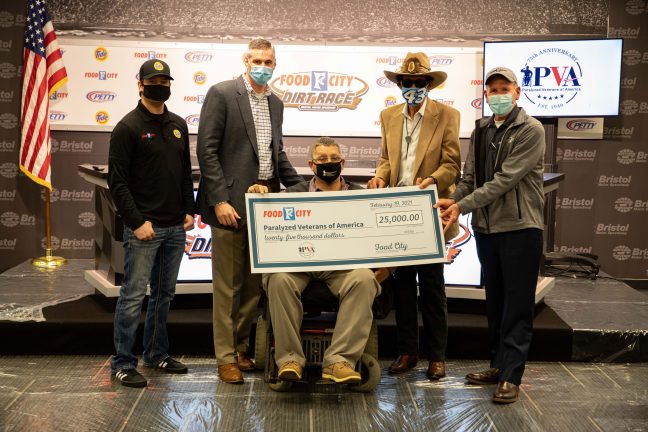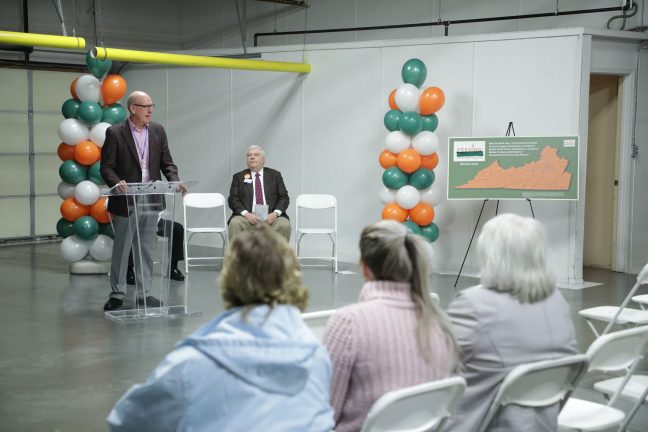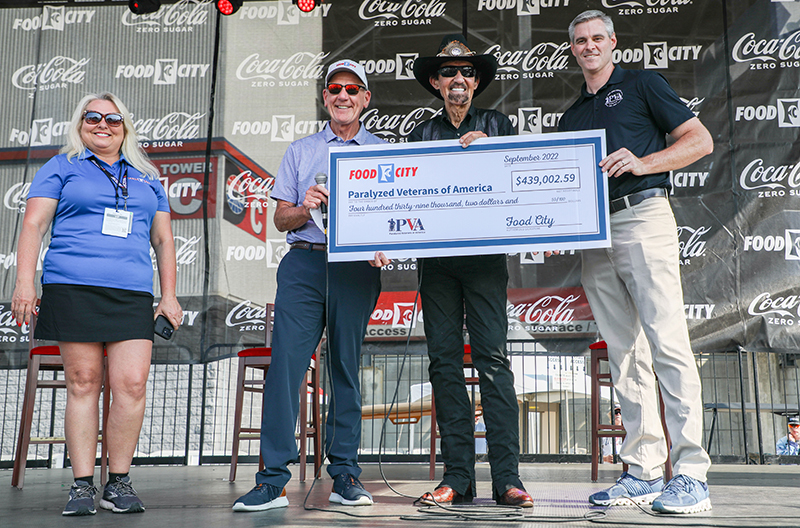Community involvement is at the center of Food City’s legacy. This year, the company is celebrating a decade of giving more than $60 million to local and national community organizations.
Food City, The Shelby Report of the Southeast’s Retailer of the Year, partners locally with a variety of nonprofits, including veterans groups, hunger relief organizations, civic clubs and animal shelters, to benefit its market areas.
“I think one of the coolest things that we do is encouraging our people to get out in the community and do something that they’re passionate about,” said Katie Penny, district manager-Chattanooga division. “We’re nothing without our community being successful. We just like to help out with our communities and continue to do good things.”
One of Food City’s most successful initiatives is its School Bucks Challenge program, which has contributed some $21 million in equipment to more than 1,000 area schools. Customers connect their Food City ValuCard to a local school to earn points on eligible purchases. The more points earned, the larger amount of funding the school will receive. During the 2022-23 school year, $700,000 was made available for schools.
As the company continues to expand into different markets, getting new schools involved with the program is a priority, according to Kevin Stafford, VP of marketing.
“When we go into new markets, we try to really encourage schools to be part of this program. Some of those major schools, we’ve done some donations to them to say, ‘Hey, I know the School Bucks program isn’t available to you yet, but here it is.’ And I think that’s a beautiful thing.”
The company’s annual Race Against Hunger campaign provides more than $500,000 in hunger relief alongside its Friends & Pets in Need campaign, which raises about $250,000. Both events help fight hunger.
Customers are invited to make a donation while checking out during Race Against Hunger. Likewise, during the Friends & Pets campaign, customers can purchase specially marked bags for $10 that contain a variety of non-perishable groceries or pet supplies which are donated to local organizations.
The company has raised more than $3 million to benefit Paralyzed Veterans of America and also supports many other organizations, including United Way, Susan G. Komen, The American Cancer Society, American Heart Association and Second Harvest Food Bank. It raises more than $500,000 annually in support of the Juvenile Diabetes Research Foundation.
The company has a separate fundraising organization, Food City Foundation, that works for these and other causes. The annual Food City Charity Golf Tournament is one of the company’s largest single fundraisers.

This past year, the tournament totalled nearly $2 million. Likewise, the company also holds its annual Food City Invitational For Education golf event, which supports the company’s School Bucks program.
“These things are important for us because our vendors, our associates understand that they’re giving their time and their resources…We’re going to be good stewards to give that money back to the communities where we operate,” Stafford said.
Internally, Food City celebrates its associates who go above and beyond for their communities with the Claude P. Varney Volunteer Recognition program. It is named in memory of the former president and board vice chairman for 47 years.
The program celebrates achievements in the areas of health, education, environment, cultural arts, recreation, heritage/history and public service. An independent panel of judges, usually from nonprofits, judge the resumes of nominees who are put forward by their co-workers. One winner is selected from each Food City store. From there, 13 district winners are selected, followed by two divisional winners. The program culminates in one honoree receiving the Claude P. Varney Humanitarian Award.
This year’s winner was Jim Watson of Abingdon, Virginia. Watson has worked at the Food City Distribution Center for 30 years and volunteered with St. Jude Children’s Hospital since his son, Cade, was diagnosed with brain cancer in 2010. Through St. Jude’s programs, the Watson family lived in Memphis, Tennessee, for nine months while Cade received treatment. The family never received a bill for treatment, housing, travel or food, according to a news release.
Watson’s son made a full recovery and now works alongside his father at the distribution center.
Since then, Watson organizes fundraisers to benefit St. Jude and raise awareness of childhood cancer. Over the past 12 years, he has raised more than $760,000.
“I am very grateful for winning this award, but to me this is about the kids of St. Jude and this award is for them,” Watson said in the news release.
In recognition of his award, Food City made a $1,250 donation on Watson’s behalf to his charity of choice. Likewise, Food City made a $750 donation on behalf of the two divisional winners, Janet Little-Edge of Bluefield, Virginia, and Shelly Roach of LaFayette, Georgia.
Understanding community
Aside from charitable work and contributions, the company believes in investing in its local communities.
“I put it in really simple terms,” Stafford said. “If the stores and the communities are both successful, the only way that happens is the stores have to plug into those communities.”
The retailer also encourages every new store to join the local chamber of commerce prior to opening.
The company advocates for each store’s leadership to be involved within the community by joining civic clubs. Food City covers the costs.
Similarly, Food City provides an allotted budget that store leaders are required to spend within the community. In addition, Stafford said the marketing department is “flooded” with requests to further allocate funding to stores.
“We literally get thousands of requests that come through and we approve or deny every single one of those requests, and we try to make sure we allocate the stores in a way where they’re plugged into those communities,” he explained.
Corporate partnerships
Every community is different and understanding that community is how Food City continues to find success.
“Once we understand what’s important, we can understand the people,” Stafford continued.

Corporately, Food City sponsors major organizations or events that appeal to local markets. For example, Food City is the official supermarket of the University of Tennessee, the University of Tennessee at Chattanooga and the University of Virginia’s College at Wise in Wise, Virginia, among others.
The company’s largest partnership is with Bristol Motor Speedway and NASCAR. Food City is the official supermarket sponsor of BMS, and since 1992, has been the title sponsor for multiple races there, including the NASCAR Xfinity Series Food City 300 and the Cup Series Food City 500 (Food City Dirt Race).
“The Food City name has become synonymous with NASCAR racing in the area with the sponsorship of two of the sport’s most popular races. As the second-longest running sponsor in NASCAR, we have also contributed over half-a-million dollars to local organizations through our annual Family Race Night events,” the company’s website states.
Disaster relief
“When disaster strikes, this company is looked upon by local leaders to make a difference,” Stafford said.
Food City, along with its parent company, K-VA-T Food Stores Inc., hold fundraisers following disasters. Last year, the retailer led a fundraising campaign to benefit those affected by July storms in eastern Kentucky. To kick it off, K-VA-T pledged $25,000, as well as providing water and dry groceries.
Similar campaigns were held in recent years to benefit those affected by floods in Hurley, Virginia, and a tornado in Cookeville, Tennessee.
Quick community response is an expectation of President and CEO Steve Smith.
“There’s a number of times like that. And that’s the expectation from Steve. We’re going to not only be plugged in the communities, but we will take care of the communities where we operate stores,” Stafford said.
K-VA-T supports its associates when disaster strikes via the K-VA-T Associate Relief and Emergency Fund. Associates who have fallen on difficult times due to home fires, natural disasters, medical emergencies or other events can find support through the KARE fund. Since its inception in 2006, the fund has awarded more than $2.2 million to qualifying associates. The KARE fund is maintained through voluntary payroll deductions. About 45 percent of associates contribute to the fund, according to Food City’s website.

